
Paese Sera was an Italian afternoon newspaper published between 1949 and 1994.

Paese Sera was an Italian afternoon newspaper published between 1949 and 1994.
The newspaper was founded in Rome in 1949, as the afternoon edition of the newspaper Il Paese. [1] Close to the Italian Communist Party, it was intended as a left-wing alternative to the popular center-right Roman newspapers Il Messaggero and Il Tempo . [2] Differently from the official organ of the party, L'Unità , Paese Sera gave ample room to more light and popular themes such as gossip news, crime reports, comic strips and horoscopes. [2] The first editor was Tomaso Smith, who resigned in 1956, opposing the choice of the Italian Communist Party of supporting the Soviet invasion of Hungary. [2] Among its collaborators were Umberto Eco, Gianni Rodari, Norberto Bobbio, Maurizio Costanzo, Edoardo Sanguineti, Tullio De Mauro, Natalino Sapegno, Arrigo Benedetti, Andrea Barbato, Elio Pagliarani, Aldo Biscardi, Bonvi, Massimo Mattioli and Pino Zac. [2] [3] [4] In 1963, with the closure of Il Paese, it replaced it with a morning edition. [1] [2]
Following increasing competition, the disinterest of the Communist Party, and a significant drop in sales, the newspaper first closed in 1983. [2] Thanks to the creation of a cooperative formed by its employees and to a readers' subscription the newspaper reprised its publications shortly later, before closing again in 1994. [2]
A few short-lived attempts to relaunch it were attempted in the following years. [2]

Silvio Berlusconi was an Italian media tycoon and politician who served as the prime minister of Italy in four governments from 1994 to 1995, 2001 to 2006 and 2008 to 2011. He was a member of the Chamber of Deputies from 1994 to 2013; a member of the Senate of the Republic from 2022 until his death in 2023, and previously from March to November 2013; and a member of the European Parliament (MEP) from 2019 to 2022, and previously from 1999 to 2001. With a net worth of US$6.8 billion as of June 2023, Berlusconi was the third-wealthiest person in Italy at the time of his death.

Giovanni "Gianni" Agnelli, nicknamed L'Avvocato, was an Italian industrialist and principal shareholder of Fiat. As the head of Fiat, he controlled 4.4% of Italy's GDP, 3.1% of its industrial workforce, and 16.5% of its industrial investment in research. He was the richest man in modern Italian history.
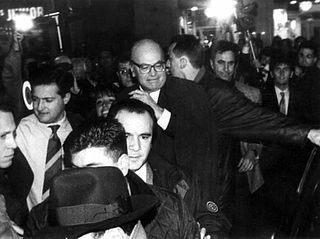
Mani pulite was a nationwide judicial investigation into political corruption in Italy held in the early 1990s, resulting in the demise of the so-called "First Republic" and the disappearance of many Italian political parties. Some politicians and industry leaders committed suicide after their crimes were exposed. Antonio Di Pietro was the main judicial figure in charge of the investigation.

Palmiro Michele Nicola Togliatti was an Italian politician and leader of Italy's Communist party for nearly forty years, from 1927 until his death. Born into a middle-class family, Togliatti received an education in law at the University of Turin, later served as an officer and was wounded in World War I, and became a tutor. Described as "severe in approach but extremely popular among the Communist base" and "a hero of his time, capable of courageous personal feats", his supporters gave him the nickname il Migliore. In 1930, Togliatti renounced Italian citizenship, and he became a citizen of the Soviet Union. Upon his death, Togliatti had a Soviet city named after him. Considered one of the founding fathers of the Italian Republic, he led Italy's Communist party from a few thousand members in 1943 to two million members in 1946.

la Repubblica is an Italian daily general-interest newspaper with an average circulation of 151,309 copies in May 2023. It was founded in 1976 in Rome by Gruppo Editoriale L'Espresso and led by Eugenio Scalfari, Carlo Caracciolo, and Arnoldo Mondadori Editore as a leftist newspaper, which proclaimed itself a "newspaper-party". During the early years of la Repubblica, its political views and readership ranged from the reformist left to the extraparliamentary left. Into the 21st century, it is identified with centre-left politics, and was known for its anti-Berlusconism, and Silvio Berlusconi's personal scorn for the paper.

Fausto Bertinotti is an Italian politician who led the Communist Refoundation Party from 1994 to 2006. On 29 April 2006, after the centre-left coalition's victory in the Italian general election, he was elected President of the Chamber of Deputies, a position he held until 2008.

Marco Rizzo is an Italian politician, who served as leader of the Communist Party (PC) from 2009 to 2023, and as leader of Sovereign and Popular Italy in 2022.

The Italian Socialist Party was a social-democratic and democratic-socialist political party in Italy, whose history stretched for longer than a century, making it one of the longest-living parties of the country. Founded in Genoa in 1892, the PSI was from the beginning a big tent of Italy's political left and socialism, ranging from the revolutionary socialism of Andrea Costa to the Marxist-inspired reformist socialism of Filippo Turati and the anarchism of Anna Kuliscioff. Under Turati's leadership, the party was a frequent ally of the Italian Republican Party and the Italian Radical Party at the parliamentary level, while lately entering in dialogue with the remnants of the Historical Left and the Liberal Union during Giovanni Giolitti's governments to ensure representation for the labour movement and the working class. In the 1900s and 1910s, the PSI achieved significant electoral success, becoming Italy's first party in 1919 and during the country's Biennio Rosso in 1921, when it was victim of violent paramilitary activities from the far right, and was not able to move the country in the revolutionary direction it wanted.
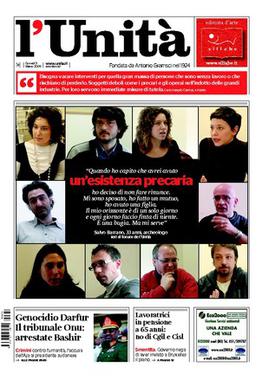
l'Unità is an Italian newspaper, founded as the official newspaper of the Italian Communist Party (PCI) in 1924. It was supportive of that party's successor parties, the Democratic Party of the Left, Democrats of the Left, and, from October 2007 until its closure in 2017, the Democratic Party.
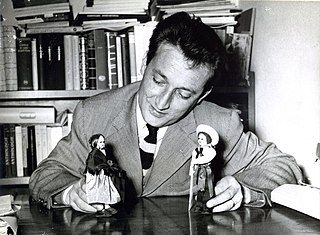
Giovanni Francesco "Gianni" Rodari was an Italian writer and journalist, most famous for his works of children's literature, notably Il romanzo di Cipollino. For his lasting contribution as a children's author, he received the biennial Hans Christian Andersen Medal in 1970. He is considered as Italy's most important 20th-century children's author and his books have been translated into many languages, though few have been published in English.

Armando Cossutta was an Italian communist politician. After World War II, Cossutta became one of the leading members of the Italian Communist Party (PCI), representing the most pro-Soviet Union tendency; his belief in that country as the leading Communist state led him to criticize Enrico Berlinguer. Later in life, although he did not regret the choice he made, Cossutta considered that he was mistaken in opposing Berlinguer.
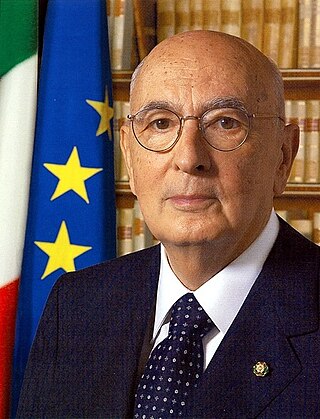
Giorgio Napolitano was an Italian politician who served as the president of Italy from 2006 to 2015, the first to be re-elected to the office. In office for 8 years and 244 days, he was the longest-serving president, until the record was surpassed by Sergio Mattarella in 2023. He also was the longest-lived president in the history of the Italian Republic, which has been in existence since 1946. Although he was a prominent figure of the First Italian Republic, he did not take part in the Constituent Assembly of Italy that drafted the Italian constitution; he is considered one of the symbols of the Second Italian Republic, which came about after the Tangentopoli scandal of the 1990s. Due to his dominant position in Italian politics, some critics have sometimes referred to him as Re Giorgio.
Avanti! is an Italian daily newspaper, born as the official voice of the Italian Socialist Party, published since 25 December 1896. It took its name from its German counterpart Vorwärts, the party-newspaper of the Social Democratic Party of Germany.

Gian Luigi "Gianni" Morandi is an Italian pop singer, actor and entertainer.

Vittorio Valletta was an Italian industrialist and president of Fiat S.p.A. from 1946 to 1966.

The Democratic Party is a social-democratic political party in Italy. The party's secretary is Elly Schlein, elected in the 2023 leadership election, while the party's president is Stefano Bonaccini.

The People of Freedom was a centre-right political party in Italy. The PdL launched by Silvio Berlusconi as an electoral list, including Forza Italia and National Alliance, on 27 February for the 2008 Italian general election. The list was later transformed into a party during a party congress on 27–29 March 2009. The party's leading members included Angelino Alfano, Renato Schifani, Renato Brunetta, Roberto Formigoni, Maurizio Sacconi, Maurizio Gasparri, Mariastella Gelmini, Antonio Martino, Giancarlo Galan, Maurizio Lupi, Gaetano Quagliariello, Daniela Santanchè, Sandro Bondi, and Raffaele Fitto.
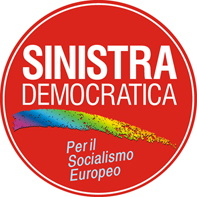
Democratic Left, whose complete name was Democratic Left. For European Socialism, was a democratic-socialist political party in Italy.

Massimo D'Alema is an Italian politician and journalist who was the 53rd prime minister of Italy from 1998 to 2000. He was Deputy Prime Minister of Italy and Italian Minister of Foreign Affairs from 2006 to 2008. D'Alema also served for a time as national secretary of the Democratic Party of the Left (PDS). Earlier in his career, D'Alema was a member of the Italian Communist Party (PCI) and was the first former Communist party member to become prime minister of a NATO country and the only former PCI prime minister of Italy. Due to his first name and for his dominant position in the left-wing coalitions during the Second Republic, he is referred to as Leader Maximo. He is also the author of several books.
The Premiolino is the oldest and one of the most important Italian journalism awards. It is made annually to six journalists from print media and television for their career achievements and their contributions to the freedom of the press.